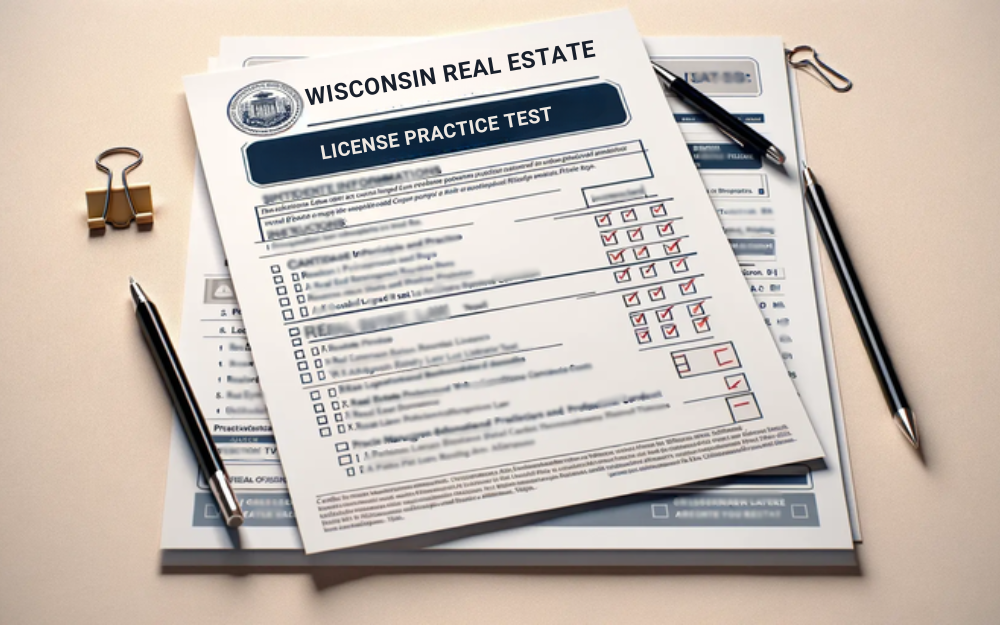
Determine your answer, then click the arrow to see the correct response.
A Homeowner in Wisconsin Refinances Their Mortgage to a New Loan Amount of $250,000 at an Annual Interest Rate of 4.25% Over a 20-Year Term. What Will Be the New Monthly Mortgage Payment (Principal and Interest Only)?
A) $1,515.35
B) $1,520.88
C) $1,530.23
D) $1,540.56
Correct Answer: B) $1,520.88
Explanation: Using the mortgage payment formula, P = $250,000, r = 0.0425 / 12 = 0.00354167, and n = 2012 = 240. M = 250,000[0.00354167(1+0.00354167)^240] / [(1+0.00354167)^240 – 1] ≈ $1,520.88.
What Is "Functional Obsolescence" in Real Estate?
A) A decrease in property value due to outdated design or features that are no longer considered desirable
B) Physical wear and tear on a property
C) A decline in property value due to changes in the neighborhood
D) Legal restrictions that limit the use of property
Correct Answer: A) A decrease in property value due to outdated design or features that are no longer considered desirable
Explanation: Functional obsolescence refers to a reduction in the usefulness or desirability of a property due to an outdated design or features that do not meet current market standards or needs.
What Is a "Title Commitment" in Real Estate Transactions?
A) A final document that proves ownership of the property
B) A promise by a title insurance company to issue a title insurance policy upon closing
C) A preliminary estimate of the property's market value
D) A document that lists the repairs needed on the property
Correct Answer: B) A promise by a title insurance company to issue a title insurance policy upon closing
Explanation: A title commitment is a document provided by a title insurance company that outlines the conditions under which it will issue a title insurance policy to the buyer upon closing of the real estate transaction.
What Is a "Fiduciary Duty" in Real Estate?
A) The obligation to disclose all known defects in a property
B) The legal obligation of a real estate agent to act in the best interest of their client
C) The requirement to pay property taxes on time
D) The duty to maintain a property in good condition
Correct Answer: B) The legal obligation of a real estate agent to act in the best interest of their client
Explanation: Fiduciary duty refers to the responsibility of a real estate agent to act loyally and in the best interest of their client, including duties of confidentiality, disclosure, loyalty, and accounting.
A Property in Wisconsin Is Valued at $650,000. The Property Tax Rate Is 1.25%. What Is the Annual Property Tax for This Property?
A) $7,625
B) $8,125
C) $8,250
D) $8,375
Correct Answer: D) $8,125
Explanation: The annual property tax is calculated by multiplying the property value by the tax rate. Annual property tax = $650,000 * 0.0125 = $8,125.
A Homeowner in Wisconsin Has a Mortgage Balance of $200,000 With an Annual Interest Rate of 5%. If They Make a Lump-Sum Payment of $50,000 Towards the Principal, How Much Interest Will They Save Over the Remaining Term of the Loan, Assuming 15 Years Are Left on the Mortgage?
A) $25,000
B) $30,000
C) $35,000
D) $37,500
Correct Answer: C) $37,500
Explanation: By making a lump-sum payment of $50,000 towards the principal, the new balance becomes $150,000. The interest savings over the remaining term of 15 years is calculated based on the difference in interest payments before and after the lump-sum payment. Interest savings = $50,000 * 0.05 * 15 = $37,500.
A Property in Wisconsin Is Being Transferred Due to a Foreclosure. Is This Transaction Subject to the Real Estate Transfer Fee?
A) Yes, all real estate transfers are subject to the fee
B) No, transfers under foreclosure are exempt from the fee
C) Only if the property value exceeds $1,000
D) Yes, but the fee can be waived upon request
Correct Answer: B) No, transfers under foreclosure are exempt from the fee
Explanation: Under Wisconsin law, transfers of real estate due to foreclosure are exempt from the real estate transfer fee (Wisconsin Statutes § 77.25)
Robert, a Landlord in Wisconsin, Plans To Retain a Portion of a Tenant's Security Deposit for Damages. What Is the Legal Requirement for Robert Regarding the Return of the Deposit?
A) The landlord can take up to 60 days to return the deposit
B) The landlord must return the deposit within 21 days after the tenant vacates the property
C) The landlord must notify the tenant within 10 days
D) The landlord does not have to provide an itemized list of damages
Correct Answer: B) The landlord must return the deposit within 21 days after the tenant vacates the property
Explanation: According to Wisconsin law, landlords must return the security deposit and provide an itemized statement of any damages within 21 days of the tenant vacating the rental property (Wisconsin Statutes Chapter 704.28).
Under Wisconsin Law, When Must a Real Estate Broker Provide a Written Agency Disclosure to a client?
A) Before the client signs any agreement
B) Only if the client requests it
C) After the first meeting with the client
D) When the transaction is completed
Correct Answer: A) Before the client signs any agreement
Explanation: Wisconsin law requires that a real estate broker provide a written agency disclosure to a client before the client signs any agreement related to the transaction. This disclosure outlines the broker’s duties and the nature of the agency relationship (Wisconsin Statutes Chapter 452.135).
A Commercial Property in Wisconsin Is Valued at $1,500,000 and Generates an Annual Net Operating Income (NOI) of $135,000. What Is the Capitalization Rate (Cap Rate) for This Property?
A) 7%
B) 8%
C) 9%
D) 10%
Correct Answer: C) 9%
Explanation: The capitalization rate is calculated by dividing the annual net operating income (NOI) by the property value. Cap rate = $135,000 / $1,500,000 = 0.09 or 9%.
